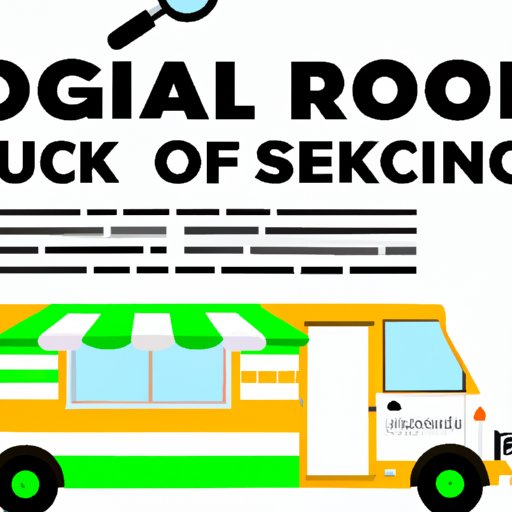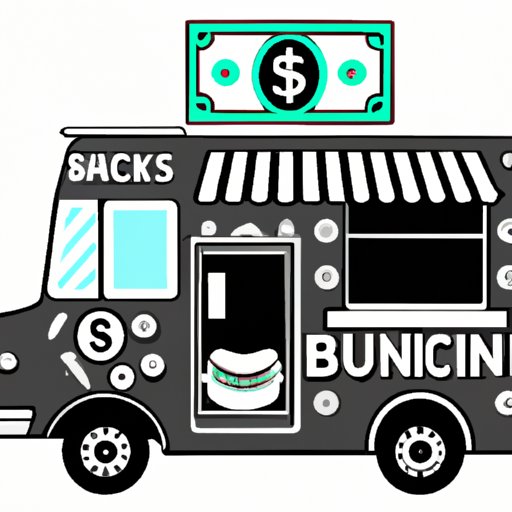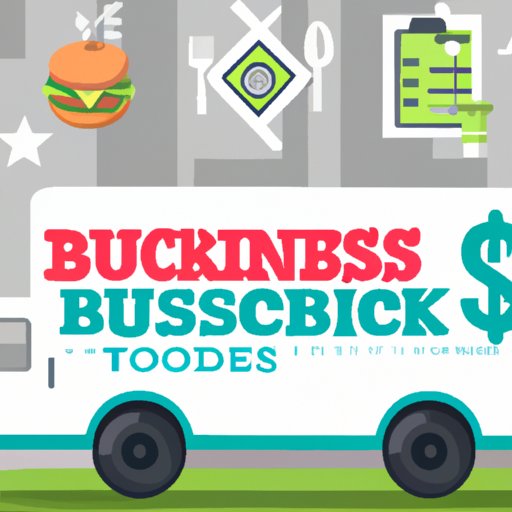Introduction
The food truck industry is booming, with more people than ever before turning to mobile eateries as their go-to source for tasty meals. Whether you’re a talented chef looking to break out on your own or an entrepreneur who loves the idea of running a business, launching a food truck can be an exciting and rewarding venture.
However, starting a food truck business requires a lot of planning and preparation. From understanding local regulations to creating a menu of offerings and promoting your business, there are many steps involved in getting your food truck up and running.
In this article, we’ll provide a complete guide to starting a food truck business. We’ll cover everything from researching regulations to developing a business plan and securing financing for your venture.

Research Local Food Truck Regulations and Requirements
Before you can even think about launching your food truck business, you need to understand local health and safety regulations. These rules vary from state to state, so it’s important to research what’s required in your area.
In most cases, you’ll need to obtain permits, licenses, and insurance before you can open your food truck. You’ll also need to familiarize yourself with zoning regulations, which dictate where you can park and operate your business.
For example, some cities have designated areas where food trucks are allowed to set up shop. Make sure you understand all local regulations and requirements before you move forward with your business plan.
Develop a Business Plan
Once you understand the local regulations, you’ll need to develop a business plan for your food truck. This document should include your goals for the business, a competitive analysis, a start-up cost estimate, a budget, a marketing strategy, and an operations plan.
You should also create a timeline for launching your business. This should include specific deadlines for tasks like obtaining permits, purchasing a food truck, stocking supplies, and creating a menu.
Your business plan should also include a detailed description of your target market. Think about who your customers are likely to be and what types of foods they’ll be interested in. This will help you create a menu that appeals to your target audience.

Secure Financing for the Food Truck
Once you have a business plan in place, you’ll need to secure financing for your food truck. Consider traditional loans, as well as crowdfunding options like Kickstarter or GoFundMe.
You should also look into grants and other funding sources. Many cities have programs that provide grants to small businesses, including food truck businesses. Do your research to find out what’s available in your area.
Purchase a Food Truck
Once you have the funds, you’ll need to purchase a food truck. You can choose between new and used options, depending on your budget and preferences. Consider the size and features you need to serve your desired menu items.
You may want to consider purchasing a used food truck and then customizing it to fit your needs. This can help you save money while still ensuring you get the right vehicle for your business.
Stock the Food Truck with Necessary Supplies
Next, you’ll need to stock your food truck with necessary supplies. Invest in quality equipment, such as a commercial refrigerator, freezer, stove, and microwave. You’ll also need to obtain food products and other supplies.
Make sure you have enough storage space to store all the ingredients, utensils, and other items you’ll need to run your business. You may also want to invest in a generator to ensure you have power when you’re parked in remote locations.

Create a Menu of Offerings
Now it’s time to create a menu of offerings for your food truck. Choose recipes that are easy to prepare and can be cooked quickly. Consider pricing, portion size, and presentation when creating your menu.
Make sure you have enough variety to appeal to different customers. You may also want to offer daily specials or seasonal items to keep your menu fresh and exciting.
Promote Your Food Truck
Finally, you’ll need to promote your food truck business. Utilize social media and other digital marketing tactics to reach your target audience. Participate in events and festivals, and develop relationships with customers.
You may also want to consider offering catering services or hosting pop-up dinners to generate additional revenue. Be creative and think outside the box when it comes to promoting your business.
Conclusion
Launching a successful food truck business takes a lot of hard work and dedication. By following the steps outlined in this article, you can create a plan for launching your business and make your dream of owning a food truck a reality.
Start by researching local regulations and requirements. Then, develop a business plan, secure financing, purchase a food truck, stock it with necessary supplies, create a menu of offerings, and promote your business.
By taking the time to do your research and planning ahead, you can set yourself up for success and make your food truck business a success.
(Note: Is this article not meeting your expectations? Do you have knowledge or insights to share? Unlock new opportunities and expand your reach by joining our authors team. Click Registration to join us and share your expertise with our readers.)
